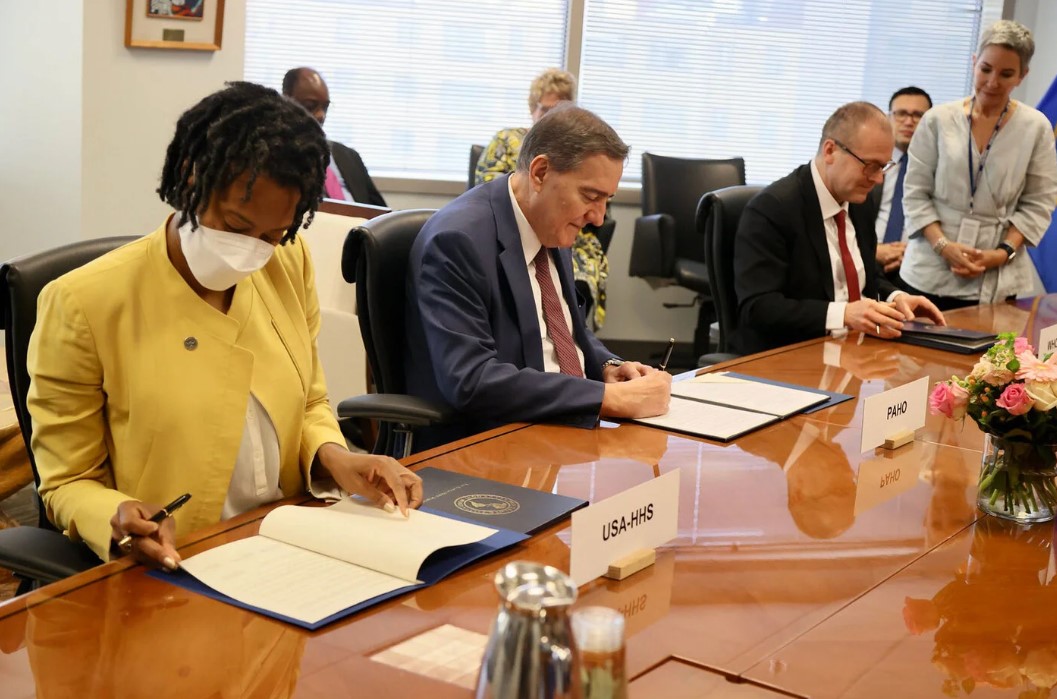PAHO, WHO/Europe, and HHS Join Forces to Address Health Inequity and Promote Collaboration

The Pan American Health Organization (PAHO), the World Health Organization Regional Office for Europe (WHO/Europe), and the United States Department for Health and Human Services (HHS) have come together to form a partnership that aims to promote global health equity and strengthen health systems in a post-pandemic world. The COVID-19 pandemic has highlighted the vulnerability of health systems and the interconnectedness of the world’s health. The partnership between PAHO, WHO/Europe, and HHS seeks to address the challenges of the future and work towards a healthier and more equitable world.
PAHO, WHO/Europe, and HHS operate in more than 85 countries across the Americas and the WHO European Region. The Collaboration Framework Arrangement between the three organizations will strengthen their ability to address health challenges and priorities in the future. The partnership will focus on strengthening global health architecture, enhancing emergency preparedness, improving vaccine manufacturing through public-private partnerships, tackling mis- and disinformation related to health and health care, supporting the health workforce through integration and training, supporting the health of indigenous populations, embedding the ‘One Health’ principle into policymaking across countries and regions, enhancing detection of and response to antimicrobial resistance, strengthening surveillance for pathogens of concern, and coordinating refugee and migrant health, including by strengthening border health systems.
Dr. Jarbas Barbosa, Director of PAHO, highlighted the importance of collaboration grounded in equity, especially in light of the lessons learned from the COVID-19 pandemic. The impact of the pandemic on health systems has been tremendous, and without collaboration, health systems everywhere are vulnerable. The new arrangement will enable PAHO, WHO/Europe, and HHS to build on their existing transatlantic ties and forge new networks to meet the health needs of people in the Americas and Europe.
Dr. Hans Henri P. Kluge, WHO Regional Director for Europe, emphasized the numerous shared health challenges faced by the Americas and the European Region, including global warming, ageing populations, noncommunicable diseases, new and reemerging pathogens, antibiotic resistance, and universal health coverage. Collaboration is essential to address these challenges, and the transatlantic partnership is an important step towards supercharging collaboration across the health spectrum. The Arctic region, which is home to indigenous communities with unique health needs, will also benefit from the partnership.
Ms. Loyce Pace, Assistant Secretary for the Office of Global Affairs for the U.S. Department of Health and Human Services, expressed gratitude for partners like WHO/Europe and PAHO who work tirelessly to provide lifesaving supplies and services to communities across the globe. The global challenges faced by the world cannot be solved by one country alone, and it is only through working together that a better, healthier, and more equitable world can be achieved. HHS is proud to sign on to the transatlantic partnership alongside PAHO and WHO/Europe to promote global health.
In conclusion, the partnership between PAHO, WHO/Europe, and HHS is a significant step towards addressing the health challenges of the future and promoting global health equity. The COVID-19 pandemic has shown the vulnerability of health systems and the importance of collaboration, and this partnership is an important step towards building stronger and more resilient health systems for the benefit of all.


